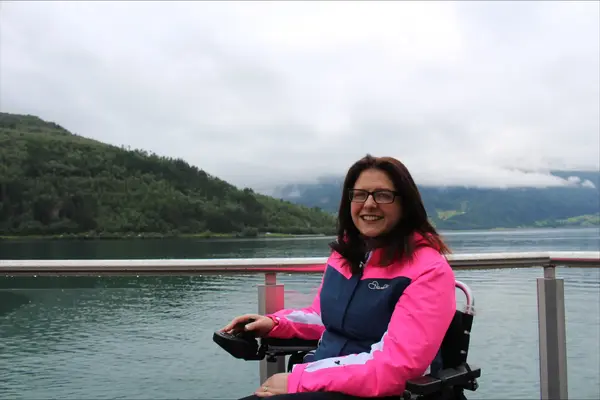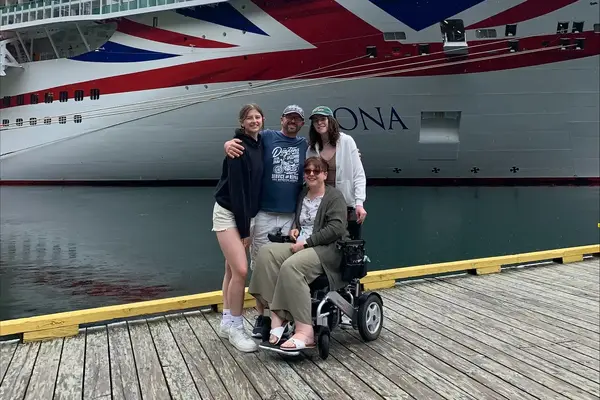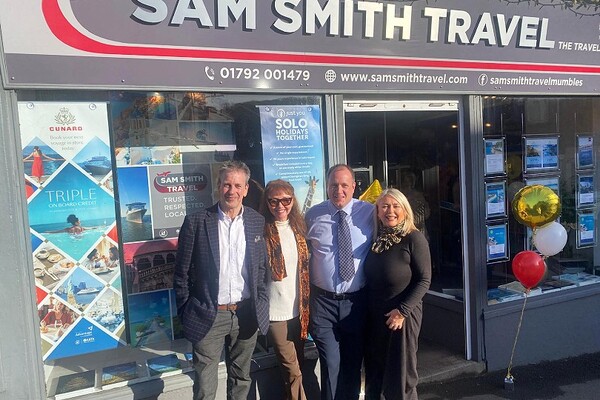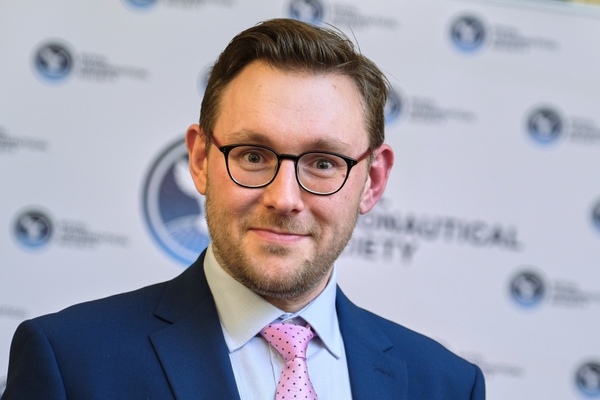‘I became a cruise agent to advocate for accessibility from within the industry’
 Katherine Masters
Katherine MastersForget gimmicks and go-kart tracks, an extra 10cm on a cabin door would be a cruise ship game changer, says wheelchair-using agent Deanne Moses-Wright
When she was 19 years old, Deanne Moses-Wright underwent an operation that was intended to fix her scoliosis, a condition that causes an abnormal curve and twist to the spine. But complications arose that that had life-changing consequences.
“After complications during and after surgery I was given 48 hours to live, but I’m thankfully still here,” she says. “I was in hospital for most of the next two years, and my list of issues is quite long, but each of them affects me in a different way. I’m very lucky that I can use my legs, but it’s not always safe for me to do so.”
At home, Deanne gets around on crutches, with everything laid out so she can manage. Outside her house, she uses a powered wheelchair, because of her various health conditions.
“I am able and disabled at the same time,” she explains. “I’m an ambulant wheelchair user, but there are some days when my conditions take over, and I absolutely can’t walk, so I also understand what it means to be completely reliant on a wheelchair.”
Early on in her disabled journey, she realised cruise was an attractive holiday option.
“I don’t mind flying,” she says. “But it fills me with dread because my wheelchair could be damaged, or not arrive at the other end. Also, it can be difficult to go to the toilet, which causes issues.”
In 2017, Deanne booked a taster sailing with P&O Cruises, out of Southampton, and she “fell in love with it”.
“We’ve done 17 cruises since then and have another one booked.”
On their typical cruise holiday, she and her husband Daren will often go ashore together for part of the day and then he will go back out to explore the places which were not accessible for Deanne, taking videos and photos to relay back. Daren doesn’t like to sit still, Deanne she loves to read a book on deck. “I can stay onboard by myself, and he’ll go off exploring, and we can both relax, because he knows I am safe and comfortable – the staff are so amazing and attentive, that if I need any help, it will be right there. We both get the holiday we crave,” she says.
Initially her two daughters were sceptical and nervous about sea sickness, but they are now converts, after she persuaded them to take a Fjords cruise: “I thought if they can see land either side, they’ll relax, and it worked – now they only do cruise holidays!”
A new career path
Deanne and Daren have run their own corporate embroidery business for 21 years but when her health took a turn for the worse in 2017, she decided to take a back seat and work from home. In 2022 she set up ‘Wheelie on the Waves’ initially on Facebook, where she shared her cruising journey, and started getting messages from fellow disabled cruisers.
“I was already giving lots advice, and then people were booking the cruise with someone else because I wasn’t an agent,” she says. “But often it went wrong because the right questions weren’t being asked – the agent hadn’t booked the correct cabin, or the necessary assistance. I thought, why don’t I cut that out, and make the bookings myself?”
Deanne adopted the Wheelie on the Waves branding when she became an agent, first with InteleTravel in April 2024, before joining Premier Travel as a homeworker last November. She remains signed with InteleTravel for the next two years to see her bookings through.
Accessible gold standards
When you have the cabin to suit your needs, and are aware of the possible limitations of each ship and itinerary before booking, then cruising is a fabulous way to travel, is Deanne’s view.
There are several features that make a cabin accessible, she explains. An accessible cabin usually has a wider door so the occupant can fit through while in their wheelchair or on their mobility scooter, without getting out of the device. There’ll be space in the cabin for a wheelchair to move around, to get to the side of the bed, and for the user to get in and out of bed, from the wheelchair. An accessible bathroom should have a roll-in shower, with a seat, rails around the toilet and the sink lowered so the passenger can access the sink and the toilet by themselves.
“Theoretically in an accessible cabin, you should be able to cope for the most part by yourself, or with a little bit of assistance from your travelling companion as you would at home.”
“We want to feel like our wheelchair isn’t a barrier so we can do whatever anybody else can do, within reason, within our own limits. I understand if I can’t get onto the basketball court to play, but I would like to get up to the court to enjoy watching my children playing.”
Which lines are getting it right?
“I have cruised a lot with P&O Cruises on various ships, and I don’t feel like I’ve ever really been let down by them,” says Deanne. “There are a few minor things, like the Retreat on Ventura and Azura not being accessible by lift. But in the main, they do extremely well if you’re in the right cabin in the first place. However, their new accessibility policies, regarding the need to book an evacuation chair, have meant that being able to find availability for myself or my clients on UK sailings with them is much more difficult.”
“We struggled on one occasion on an MSC cruise because their announced designated disembarkation point for wheelchair users had two steps to get to the wheelchair ramp. So that was interesting! But they did arrange another exit.
“We’ve never had any issues at all on Princess Cruises ships. They’ve been really welcoming and even had a wheelchair lift for when we needed to tender ashore. But they don’t have as many UK sailings as P&O Cruises, so that is taking some people out of the market.
“Our sailing with NCL was great, and again I didn’t face any major issues, but again UK sailings are few and far between. Ambassador Cruise Line have a large amount of UK sailings, but unfortunately very few accessible cabins, which is disappointing.
“After completing all of the training modules with Celebrity Cruises and Royal Caribbean, they sound ideal and I would love to get onboard and try them out for myself.”
The value of ship visits
Getting onboard ships herself, if not for a full-blown cruise, then at least for a ship visit, is vitally important, says Deanne. This is because marketing and training materials can paint a rosy picture of accessibility, which doesn’t necessarily translate into positive experiences onboard. “When I have experienced a ship myself, I feel confident recommending it to my clients. Without actually getting onboard and checking out the possible barriers we come up against personally, I can’t confidently say a ship is ideal for a disabled traveller.
“What an able-bodied person considers to be a step, is different to a disabled person. We can literally be talking centimetres, but if you’re in a power chair that can’t navigate any step or threshold barrier, it could be extremely limiting.”
Deanne explains: “I have found myself on occasions going out on deck through one door, trying to get back in through another door, and not being able to get back in. I then have to go all the way back around the ship to the original door, because that’s the only one where the lip is small enough for the chair to go over.”
It can also be useful for a cruise line to host a wheelchair user on a ship visit, she points out: "Recently I had a day visit with Fred Olsen with two other agents who were also in a wheelchair. We were able to give feedback to the cruise line and they realised their fully accessible cabins needed a few adjustments. It was a very positive experience.”
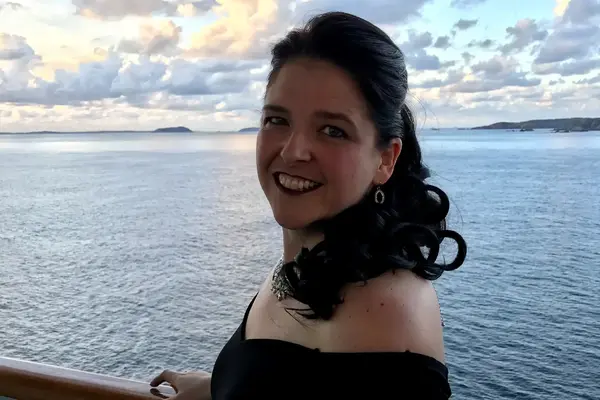
Lack of accessible cabins
Fly-cruises are not an option for many of Deanne’s clients, and so they’re reliant on ships that homeport in the UK. But demand is outstripping supply, she says.
“There aren’t enough accessible cabins – that’s an industry wide thing,” she says. “I compile a list of people who want to book with me as a new season opens, because if they don’t book at the earliest opportunity, they’re not going to get the accessible cabins.”
“It’s a good job I’m not in this job for the money, because it’s a long time until I get paid,” she quips.
Redesigning a greater number of standard cabins to have wider doors would solve many problems, she suggests. “An extra 10 centimetres on cabin doors where people could drive themselves into their cabins and not have to worry about somebody else lifting their power chair or mobility device in for them – that would make the world of difference.”
Deanne says she’s not pushing for bigger cabins, just wider doors and the space to park a wheelchair or scooter in the cabin. This is due to the volume of potential clients who only use these devices for navigating the decks, or even just when ashore and do not need any of the other accessible facilities at all. They could therefore cope very well in a standard cabin, if only the door were a little wider, and this would free up the fully accessible cabins for those who truly need them.
“It sounds very simple, doesn’t it?” she laughs.
Shining a light on the issues
Being able to advocate from within the industry was another reason why Deanne decided to become a travel consultant.
She thought she would be an extra voice in a community that already existed, but says she was disappointed when she went to the CLIA UK website and could not see one disabled person in any of their working party groups.
“That’s when I emailed and said, please, let me help.”
There are simple things that can be rectified easily, she advises, such as putting the food labels in the buffet downward-facing and not upward-facing, so they can be seen by people in wheelchairs. “Little things like that make a big difference,” says Deanne.
Now her business is up and running, with customers regularly booking on cruises, she’s fallen in love with her new career: “I love being able to assist people who would never travel if they didn’t have the right person at this end. I say to them – tell me what you are worried about, and we’ll go through it step by step. I talk them through the whole process, what happens when they park their car, when they check in, when they get onboard. Mine is a really personal service.
“It’s hard enough to do the research when you are in the industry, so it’s doubly hard for people outside of it, and there is so much scaremongering that goes on in Facebook groups [for the disabled community that are focused on cruise].”
The need to keep up to date with legislation and processes that vary from line to line is why Deanne wants to focus her efforts on her specialist niche. “Anyone can book an accessible cruise but you’ve got to be willing to put the time and effort in, so you give the customer the right information.
“Although I can, and do book travel for all, I specialise in something where I can give 100%, and have personal experience,” she continues. “I know when it goes wrong, that will have a huge impact on the disabled person travelling. But when it goes right, there’s a feeling of independence and freedom for the wheelchair user, which makes a much better experience for the whole family – and that is priceless.”
Sign up for weekday travel news and analysis straight to your inbox

Katherine Masters
Supplier Directory
Find contacts for 260+ travel suppliers. Type name, company or destination.
